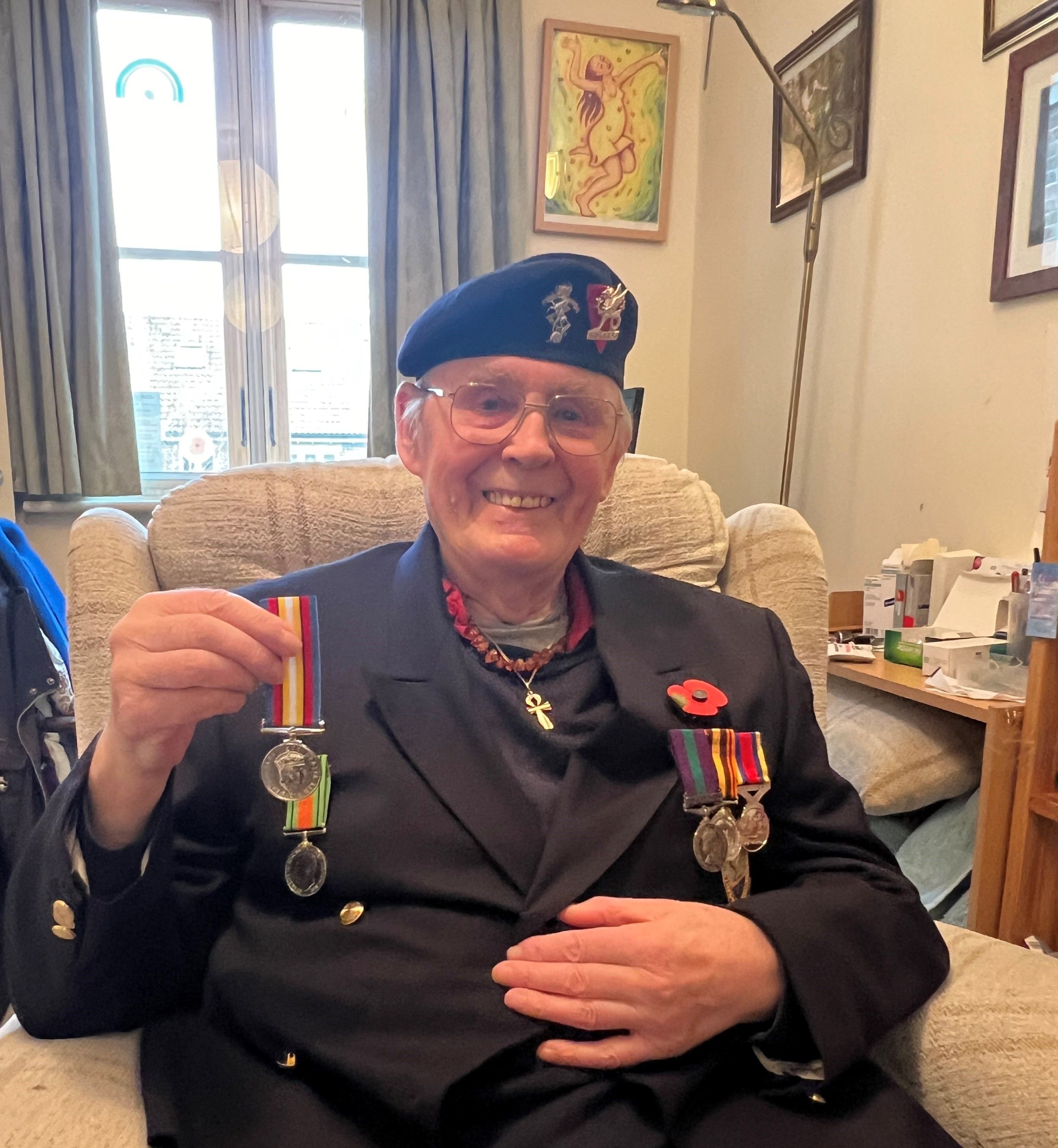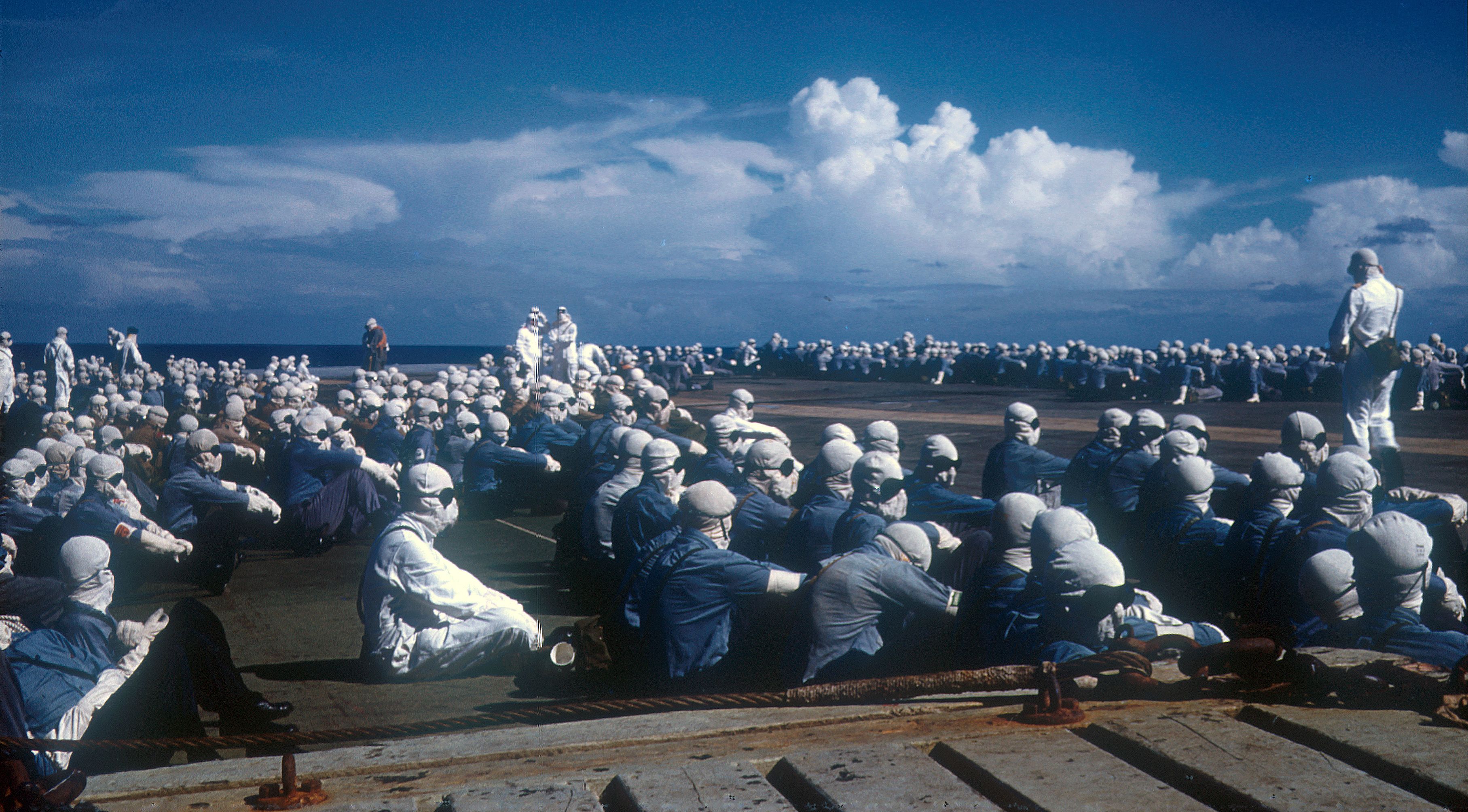
Richard Bonas was born in Berkshire in 1938 and now lives in Glastonbury. During his childhood his mother was injured in an air raid and his father passed away when he was still young. Bonas joined the Army and was first posted to Northern Ireland where he remained for two years. Following this, he was exposed to the nerve agent, sarin, at Britain’s secretive biological and chemical weapons research facility, Porton Down. This experience left him with breathing problems for which he was later compensated by the UK government. After Porton Down, Bonas was sent to Christmas Island for Operation Grapple. Bonas later left the Army but continued his service in the Territorial Army. Bonas first began to come into contact with test veteran organisations in the early 1980s and has received support from the Nuclear Community Charity Fund (NCCF). He has also been involved in court cases about veterans who served at Porton Down.
Interview extracts
Description
Richard Bonas recalls a childhood memory from the Second World War, describing an air raid shelter shared with a neighbour and the terror experienced during an air raid. Since his childhood home was on the outskirts of London, he remembers the air raids being both regular and violent. His father, who worked as an auxiliary fireman, died not long after the war. Bonas went on to join the Royal Electrical and Mechanical Engineers (REME) as a ‘fitter’s mate’. In 1958, he was sent to Christmas Island, and recounts walking around ground zero of a Grapple Z test shortly after an atomic bomb had been detonated.
This is a short extract from an in-depth interview. Richard Bonas was recorded for the Oral History of British Nuclear Test Veterans project in 2024. The interviewer was Christopher R Hill. This project was run in partnership with National Life Stories and the full interview can be accessed at the British Library.
Transcript
Some of my earliest memories are, where we were living we shared an air raid shelter at the bottom of the garden with a lady, Mrs Dooley, next door, middle-aged lady. And Mrs Dooley, the raid was on, the air raid siren had gone, and it was early, it was nighttime, and we were… Mrs Dooley had gone to the air raid shelter, in the dark, the sky was on fire it looked, could have been 1941 when, you know – ’40, ’41 – during the Blitz, it must have been during the Blitz. And she’d gone, Mrs Dooley had gone to the air raid shelter, then suddenly remembered her deed box, and rushed back up the narrow garden path to get her deed box, bumped into my mother and me, knocked me flying – my mother was carrying me, I had a sister, two years older than me - and we went flying. And I remember laying on the ground, looking up at the guttering – it was very low guttering, because I’ve been past the building since in the 1960s, and, where we used to live, Pooley Green, Surrey – and I remember looking up at the guttering and the fire in the sky and screaming and screaming and screaming with terror. I remember Mrs Dooley’s face coming out of the darkness; short, dumpy woman with short grey hair, bumping into my mother. Because my mother moaned about that, because she fell over and scraped her leg, she moaned about that for ages afterwards, I can remember her afterwards saying, ‘Bloody stupid Mrs Dooley, look what she’s done to my leg’, this, that and the other, and I was absolutely terrified. I remember looking up and the sky looked like it was on fire.
[ends at 0:02:04]
Description
Richard Bonas recalls volunteering for a physiological course at Porton Down, a biochemical warfare establishment in Wiltshire. He was unaware of precisely what the course entailed. Shortly after arriving at Porton Down, however, he and other volunteers were subjected to a series of chemical weapons experiments, which included the use of mustard gas. In the clip, Bonas describes the effects of inhaling the nerve agent sarin gas. The experience proved to be a turning point, as it gave him a sensitivity to light that tormented him whilst on Christmas Island, where he spiralled into depression. Bonas’s experiences at Porton Down and Christmas Island both reveal a troubling set of medical and military assumptions about the soldier’s body and consent.
This is a short extract from an in-depth interview. Richard Bonas was recorded for the Oral History of British Nuclear Test Veterans project in 2024. The interviewer was Christopher R Hill. This project was run in partnership with National Life Stories and the full interview can be accessed at the British Library.
Transcript
Prior to that, in 1957, I volunteered for Porton Down. It came up on orders when I was at Bicester, volunteers wanted to go to Porton Down for a physiological course. I asked this sergeant, what’s all this about? Didn’t know what physiological meant. So he said, oh, you’re out in the fields, you know, gas capes and all that. I thought, that’s a bit of a change from working in the workshop, I’ll volunteer for that. Well, I got to Porton Down, it was, it was wonderful. It would have been like an officers’ mess, I suppose. Not that I’d know what an officers’ mess was like. And we soon found out, they put us in the gas chambers and they pumped in sarin gas, and there was a big window where the doctors were standing with their white coats and their notes, and I just went, I took a breath of this, I went down, bang. I couldn’t breathe, I was choking, I couldn’t breathe. I thought I was dying, I was nineteen. The Lieutenant Colonel knelt down, put his hand on my shoulder and said, ‘This will pass’. Eventually it did. I know my eyes were so – everyone’s – it dilated the pupils, or the pupils got bigger, and anyway, eventually, I know I was playing cards for money and losing and thought it was funny. I never gambled in the army, never gambled anyway. And it so affected our eyes you couldn’t stand bright lights. And, you know, you weren’t allowed to smoke in there, but afterwards, I was I think there for about a week or ten days, they did all sorts of things with us, gave us injections, mustard gas, the gas here.
A scar?
A scar, the round scar. Anyway, I think they… yeah, it is, and you’ll see it now. There, on each arm. And other things they did. And you’d strike a match, you couldn’t even stand the brightness of a match, and you’d, you know, and you’d, you know, like pff pff pff, try and light your fag. [sighs] And it was then, when I used to lay down at night – uh! I couldn’t breathe. And on Christmas Island, that got really, really worse. So I laid down on my back – oh! They call it sleep apnoea now, don’t they?
Yeah.
But I didn’t know that then. I kept reporting sick. Oh, it’s him again, Bonas again. Two codeine and duty. I asked to see a psychiatrist. We haven’t got one on the island.
[ends at 0:03:11]


